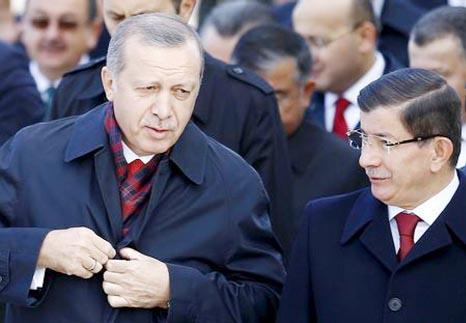
AFP, Ankara :
Turkey’s Prime Minister Ahmet Davutoglu was on Thursday set to pave the way for his own departure from the jobs of ruling party chief and head of government, in a dramatic turn of events that will boost the power of President Recep Tayyip Erdogan.
Divisions between Davutoglu and Erdogan that had been rumoured for months erupted into the open on Wednesday, with the two leaders holding crisis talks at the presidential palace that failed to resolve the conflict.
The central executive committee of the ruling Justice and Development Party (AKP) will meet later Thursday morning and Davutoglu will then announce the convening of an extraordinary party congress later this month, the NTV and CNN-Turk channels reported.
Davutoglu will not be a candidate for the party chairmanship at the congress, meaning that he will step down from both the posts of premier and party chief, newspapers including the Hurriyet and Milliyet dailies reported.
According to the conventions of the AKP – a party co-founded by Erdogan to bring Islam into the mainstream of Turkey’s secular politics – the party chairman and head of government are the same person.
Davutoglu, who became premier in August 2014 when Erdogan moved from the premiership to the presidency, will make a highly-anticipated press statement after the meeting of the party committee, the official Anatolia news agency reported.
“Davutoglu steps aside,” said the headline in the Hurriyet daily. “A new era in the AKP,” added the Milliyet newspaper.
“Palace Coup,” headlined the opposition Cumhuriyet daily. “The summit meeting did not find a solution and Erdogan put a full stop,” it added.
The possibility of tumult at the top of Turkish politics unnerved financial markets, with the lira extending Wednesday’s losses to lose 1.09 per cent in value against the dollar to trade at 2.93 lira to the greenback.
The appointment of a potentially more pliant prime minister would allow Erdogan to further consolidate his powers as he seeks to win backing for controversial constitutional changes to make Turkey a presidential system.
Since becoming president in August 2014 after over a decade as prime minister, Erdogan has sought to tighten his grip on the levers of power, leading critics to accuse him of authoritarianism.
Soner Cagaptay, director of the Turkish Research Program at The Washington Institute, said the move was the next stage in a “hollowing out” of Turkish institutions by Erdogan who already controls the army and parliament.
“It shows how much power has been massed in one person’s hands,” he told AFP, adding that Erdogan was now exercising more control than anyone in Turkey’s modern democratic history.
The departure of Davutoglu “will allow Erdogan to distance himself from some of his failed policies that can be attributed to Davutoglu,” he added.
Leading potential successors if Davutoglu steps aside include the president’s longtime henchman, Transport Minister Binali Yildirim and the youthful Energy Minister Berat Albayrak, 38, who is married to the president’s eldest daughter Esra.
Turkey’s Prime Minister Ahmet Davutoglu was on Thursday set to pave the way for his own departure from the jobs of ruling party chief and head of government, in a dramatic turn of events that will boost the power of President Recep Tayyip Erdogan.
Divisions between Davutoglu and Erdogan that had been rumoured for months erupted into the open on Wednesday, with the two leaders holding crisis talks at the presidential palace that failed to resolve the conflict.
The central executive committee of the ruling Justice and Development Party (AKP) will meet later Thursday morning and Davutoglu will then announce the convening of an extraordinary party congress later this month, the NTV and CNN-Turk channels reported.
Davutoglu will not be a candidate for the party chairmanship at the congress, meaning that he will step down from both the posts of premier and party chief, newspapers including the Hurriyet and Milliyet dailies reported.
According to the conventions of the AKP – a party co-founded by Erdogan to bring Islam into the mainstream of Turkey’s secular politics – the party chairman and head of government are the same person.
Davutoglu, who became premier in August 2014 when Erdogan moved from the premiership to the presidency, will make a highly-anticipated press statement after the meeting of the party committee, the official Anatolia news agency reported.
“Davutoglu steps aside,” said the headline in the Hurriyet daily. “A new era in the AKP,” added the Milliyet newspaper.
“Palace Coup,” headlined the opposition Cumhuriyet daily. “The summit meeting did not find a solution and Erdogan put a full stop,” it added.
The possibility of tumult at the top of Turkish politics unnerved financial markets, with the lira extending Wednesday’s losses to lose 1.09 per cent in value against the dollar to trade at 2.93 lira to the greenback.
The appointment of a potentially more pliant prime minister would allow Erdogan to further consolidate his powers as he seeks to win backing for controversial constitutional changes to make Turkey a presidential system.
Since becoming president in August 2014 after over a decade as prime minister, Erdogan has sought to tighten his grip on the levers of power, leading critics to accuse him of authoritarianism.
Soner Cagaptay, director of the Turkish Research Program at The Washington Institute, said the move was the next stage in a “hollowing out” of Turkish institutions by Erdogan who already controls the army and parliament.
“It shows how much power has been massed in one person’s hands,” he told AFP, adding that Erdogan was now exercising more control than anyone in Turkey’s modern democratic history.
The departure of Davutoglu “will allow Erdogan to distance himself from some of his failed policies that can be attributed to Davutoglu,” he added.
Leading potential successors if Davutoglu steps aside include the president’s longtime henchman, Transport Minister Binali Yildirim and the youthful Energy Minister Berat Albayrak, 38, who is married to the president’s eldest daughter Esra.

